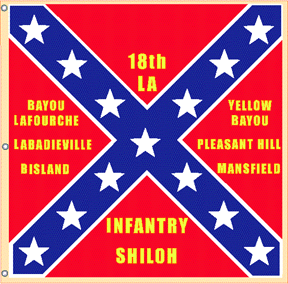Gourdain, Joseph Kleber, Capt. Co. G,
18th La. Inf. En. Oct. 5, 1861. Camp Moore, La. Rolls
from Oct., 1861, to Feb., 1862, Present. Rolls from May to
June, 1862, Absent, wounded at Shiloh, April 6, Leave
of absence 30 days from April 15, Sick. Roll for July and
Aug., 1862. Absent without leave. Roll for Jan. and Feb.,
1863, Absent, detached from Nov. 9, 1862, by order from Gen.
Hdqrs. Rolls from May to Aug., 1863, Detached June 30, 1863
(Provost Marshal). (April 6th, 1862, Shiloh...”The
result of the charge made upon the enemy by the 18th
Regiment was disastrous, especially to our company. The loss
of officers and men killed, wounded, and captured was about
200...Captain Gourdain of Thibodaux,...were
wounded;...”, Additional information transcribed from
pg. 45, “Reminiscences of Uncle Silas” by Silas T.
Grisamore.)
This officer was first lieutenant in our
company when it was organized, but upon the election of
Capt. Bush as major of the 18th Regiment at Camp Moore on
the 5th of October 1861, he was elected captain of his
company.
Capt. Gourdain was a strict disciplinarian and always
enforced a rigid obediance to orders and was equally prompt
and obedient to orders from his superiors.
The interests and welfare of his men were objects of
care, and no efforts were ever spared to secure for them all
the supplies to which they were entitled and priviledges
which were allowed to others.
At our first skirmish with the enemy 's gunboats, an
amusing scene occurred that none of the men with us is
likely to have forgotten. Our company was encamped in a
shallow ravine about 100 yards from the river bank and
almost in a line with the enemy's boats and the battery upon
which they were firing. The shells, therefore, very nearly
passed over our heads.
Capt. Gourdain, who very often gets a little excited,
ordered his men to form into line as soon as the first shot
was heard and ordered them to count off by twos. The head of
the company began, one, two; one, two; one, two; but before
they would get half through a shell would come whizzing
along over our heads, and by some peculiar coincidence, each
one of us imagined that that identical shell was going to
hit us at the root of the right ear, which idea at
once stopped the counting, and every fellow would first bend
his head as far out of the way as possible and then drop
down on his knee, whilst the shell would pass in perfect
safety two or three hundred feet above us.
The captain tried to count off three or four times but
was finally compelled to give up the attempt.
At the Battle of Shiloh, Capt. Gourdain received a wound
in the right arm on Sunday evening and was compelled to go
to the rear.
Subsequently obtaining a leave of absence, he came to his
home with the other wounded of his company. He again
returned to his regiment when it was stationed at Pollard,
Alabama, and accompained it to this side of the Mississippi
River and was in the fight at the Texana road above
Labadieville, where he was again slightly wounded in the arm
but not enough to cause him to leave the field. After our
retreat across Berwick's Bay, he was detailed on duty as
provost marshal at Franklin for a short time, when he was
made commander at the post of New Iberia, on which duty he
continued until our retreat, when he assumed command of his
company until our return to Thibodaux in June 1863, when he
was detailed as post commander there.
After our retreat, he was again stationed in New Iberia
and subsequently at Alexandria, at which station he
continued until the close of the war.
Upon the fall of Col. Armant at Mansfield, he became
major of the 18th Regiment by promotion, being senior
captain.
Major Gourdain was a native of Donaldsonville or that
vicinity and was raised in the family of the late Capt. A.
J. Powell, who was always his warm and devoted friend.
With him he studied practical engineering and located in
Thibodaux for the purpose of following that occupation. He
was, however, a few years later elected parish recorder, to
which position he was re-elected several times and was in
the possession of that office when he left in 1861.
After the surrender, he was appointed parish recorder by
Gov. Wells and remained in that office until the first
election under the new constitution. Previous to that time,
however, he had engaged in planting, having leased the
Scuddy Plantation, some twelve miles below this place. Three
years since, he removed to New Orleans and went into tine
commission business, and about one year later formed a
co-partnership with one of his former soldiers, and now the
(illegible] house of Sevin and Gourdain lll Decatur
(illegible].


